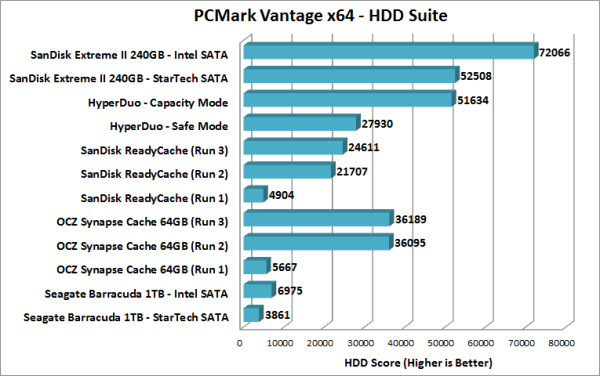To give you an idea how HyperDuo compares to some of the other SSD caching solutions we've reviewed, I ran a few tests using PCMark Vantage. The software measures the performance of the latest PC hardware across a variety of common scenarios. It supports both system level and component level benchmarking and comprises several different test suites, including one with eight separate tests that simulate common hard drive usage.

Keep in mind that these scores are going to vary greatly depending on what hard drive and SSD you using. However, in this apples to oranges comparison, you can see that HyperDuo had a considerable advantage over the SanDisk ReadyCache and OCZ Synapse Cache when in Capacity mode. It also performed equally well the first time as it on its second or third time, but this could also change depending on how full your hard drive is.
Final Thoughts:
StarTech's new PCI Express SATA RAID controller cards are best suited for the small office or home user looking to add support for SATA 6Gbps or RAID to an older computer. Those with a newer, Intel-based computers are probably going to be better off using the onboard SATA controller. As you saw in our tests, the PEXSAT34RH had a hard time keeping up with the SATA controller on our test computer. The performance difference was relatively small with hard drives, but transfer rates dropped by as much as 150 MB/s when used with an SSD. There were no real surprises when using the PEXSAT34RH's RAID capabilities. Considering its performance with a single SATA hard drive, the card performed as expected in both RAID 0 and 1.
What really makes StarTech's new PCI Express SATA RAID controller cards stand out is their support for Marvell's HyperDuo technology. This hardware-based SSD acceleration technology worked surprisingly well in our tests. When in Capacity mode, it not only used the full capacity of both the SSD and hard drive, it delivered performance that was nearly on par with SSD by itself. The performance wasn't nearly as impressive when HyperDuo was in Safe mode. However, this does add an extra layer of protection by mirroring data from the SSD onto the hard drive. HyperDuo can also be combined with RAID but requires an additional SSD to do so.
Aside from the mediocre SATA performance, the only real complaint I have about StarTech's new PCI Express SATA RAID controller cards is the price. The PEXSAT34RH and PEXSAT34SFF currently go for $80 and $104, respectively, on Amazon. Similar solutions from SYBA and HighPoint cost, in some cases, half as much and include extras like cables.
Highs:
- Mavell 88SE9230 chipset with HyperDuo SSD auto-tiering technology
- Supports JBOD, RAID 0, RAID 1 and RAID 1+0
- PCI Express 2.0 x2 interface
- Four SATA 6Gb/s ports (PEXSAT34RH only)
- Near SSD level performance with HyperDuo in Capacity mode
- Port Multiplier supports up to 7 devices
- Can be configured via BIOS or management utility
- Compatible with Windows, Mac OS X and Linux
- Includes low profile bracket
- 2 year warranty
Lows:
- Mediocre SATA performance
- HyperDuo is Windows only
- Does not include any cables
- HyperDuo has little impact on write speeds in Safe mode
- Pricey

